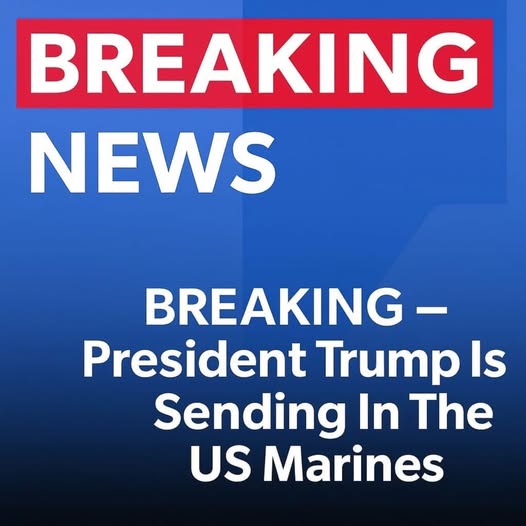The U.S. military has officially confirmed a move that has stirred significant public debate and drawn scrutiny from multiple corners: approximately 200 Marines are being temporarily deployed to the state of Florida to provide logistical, operational, and administrative support to Immigration and Customs Enforcement, commonly known as ICE. This announcement comes amid a heightened focus on immigration enforcement in several key states, and officials insist that the Marines’ role will strictly remain non-combat in nature.
According to military sources, the deployment is part of a broader initiative to strengthen ICE operations in states facing high immigration activity and related logistical pressures, such as Texas and Louisiana. The goal, they say, is to ensure that detention centers and administrative facilities have sufficient personnel to manage paperwork, transport coordination, and internal support functions. These measures, they argue, will allow ICE agents to focus on their core responsibilities without being stretched too thin.
It is important to note that these 200 Marines will not participate in enforcement actions, raids, or any activities that involve detaining individuals directly. Their responsibilities are limited to tasks such as organizing records, maintaining secure transport routes within facilities, assisting with logistical planning, and other administrative operations. In essence, the Marines are being asked to support ICE in ways that do not place them in direct contact with detainees or in situations that could be classified as combat or enforcement operations.
Nevertheless, the announcement has ignited significant public backlash. Civil rights groups, immigration advocates, and political commentators have expressed concern over the precedent of using active-duty military personnel to support civilian law enforcement agencies. Critics argue that even the presence of uniformed Marines within ICE facilities could be intimidating to detainees and may blur the lines between military and civilian authority. “This is a dangerous expansion of military involvement in domestic affairs,” said one advocacy leader, emphasizing the potential implications for civil liberties and public trust.
Supporters of the deployment counter that the Marines’ involvement is strictly supportive and logistical, not operational, and that the military has a long history of providing administrative assistance to civilian agencies in emergency or high-pressure situations. They argue that the move allows ICE to operate more efficiently while ensuring that Marines are not placed in situations that conflict with domestic law restrictions on military engagement in civilian matters.
The decision comes amid growing political debate over immigration policy, particularly in southern states where ICE facilities are often at or near capacity. Florida, in particular, has faced challenges related to processing large numbers of detainees, coordinating with federal courts, and maintaining security within detention centers. Officials claim that the Marines’ deployment will alleviate some of these pressures and provide critical support to ensure smooth operations.
However, public sentiment remains divided. On social media, posts criticizing the deployment have gone viral, with hashtags calling for increased oversight and transparency in military-civilian collaborations. Local community leaders have raised questions about accountability, oversight, and the psychological impact on both ICE employees and detainees who may encounter armed or uniformed personnel within a traditionally civilian space.
Legal scholars have weighed in as well, noting that while the U.S. Constitution allows for certain domestic support roles for the military, the historical use of active-duty troops in immigration enforcement contexts has been extremely limited. They caution that repeated reliance on military resources for domestic civilian functions could shift the established norms governing the separation of military and law enforcement roles in the United States.
As of now, military officials emphasize that the deployment is temporary and intended to address immediate operational needs. ICE representatives have echoed this sentiment, assuring the public that the Marines’ presence will not affect ongoing enforcement policies or operational decisions regarding detainees. Training for the Marines on appropriate procedures within ICE facilities has been conducted to reinforce the non-combat nature of their assignment, ensuring adherence to legal and ethical guidelines.
The unfolding situation highlights the complex intersection of immigration policy, military involvement in domestic operations, and public perception of government authority. While the Marines’ deployment is framed as a logistical support mission, it raises broader questions about the evolving roles of military personnel in civilian government functions and the potential long-term effects on public trust, civil rights, and institutional boundaries between military and law enforcement agencies.
In summary, the deployment of 200 U.S. Marines to Florida to support ICE operations is a multifaceted development. It is officially non-combat and strictly administrative, intended to alleviate pressures in detention centers and support agency operations. Yet, the move has sparked significant debate regarding the implications of having uniformed military personnel operating alongside civilian law enforcement, highlighting ongoing tensions in immigration enforcement and the balance between operational efficiency and civil liberties.
